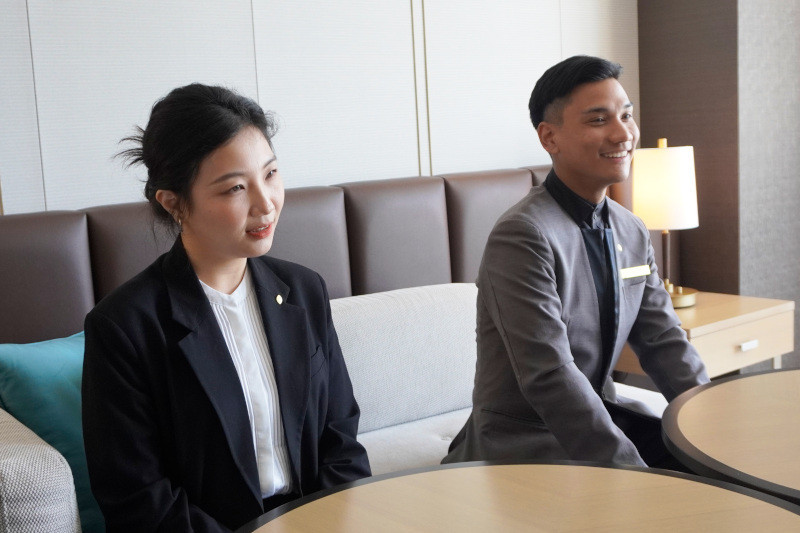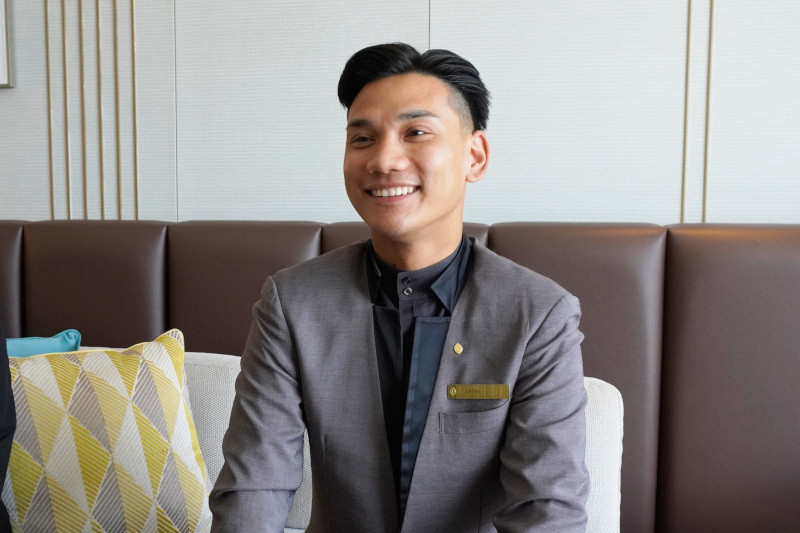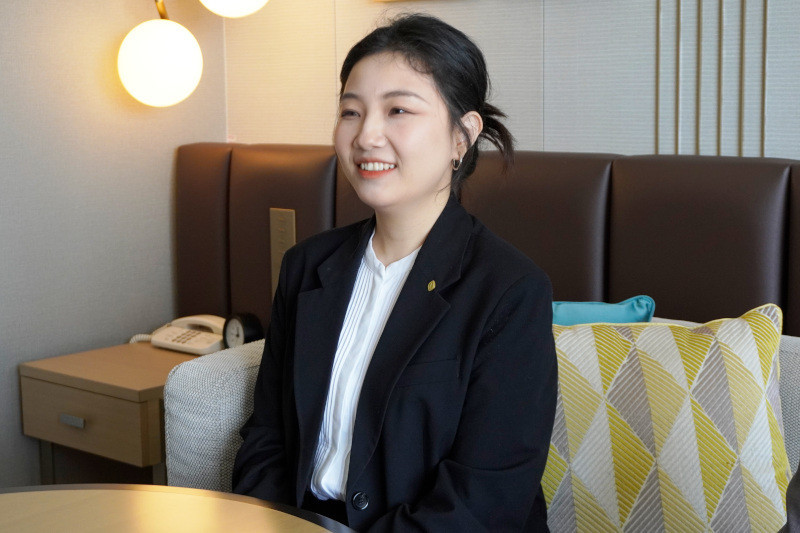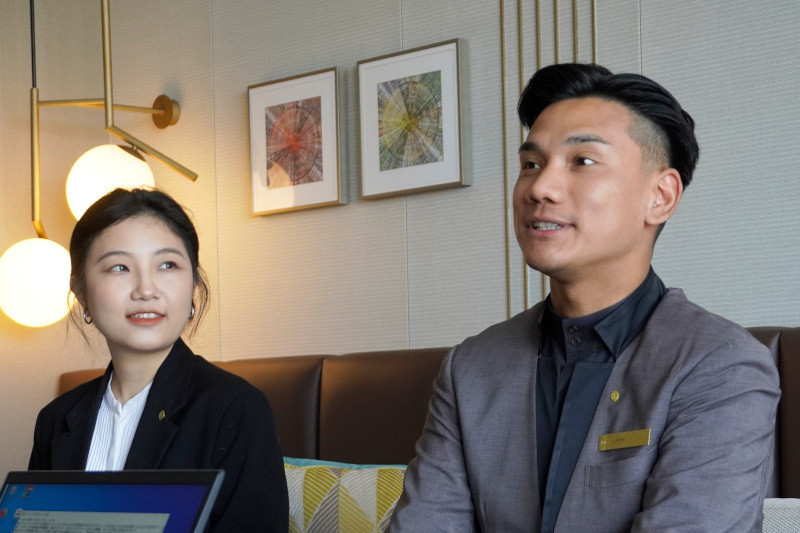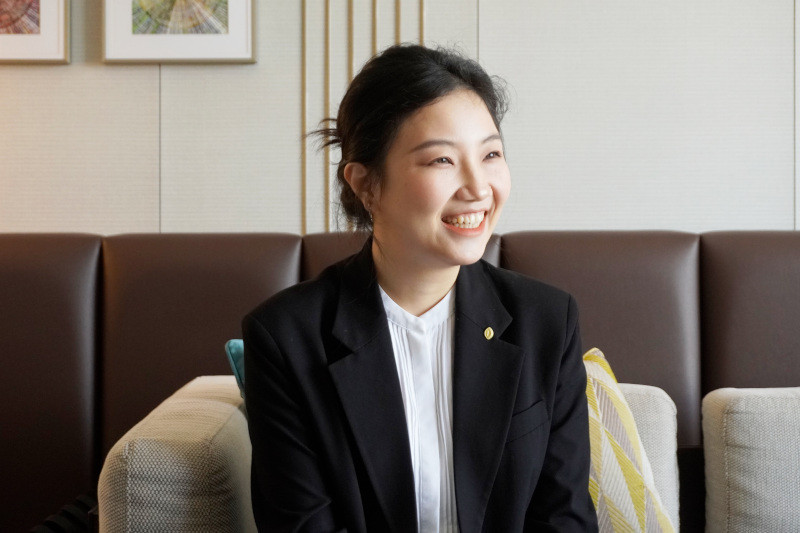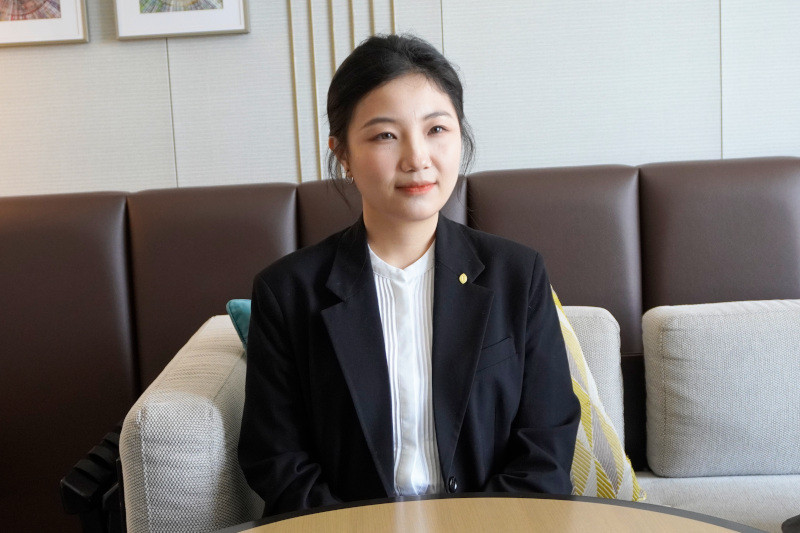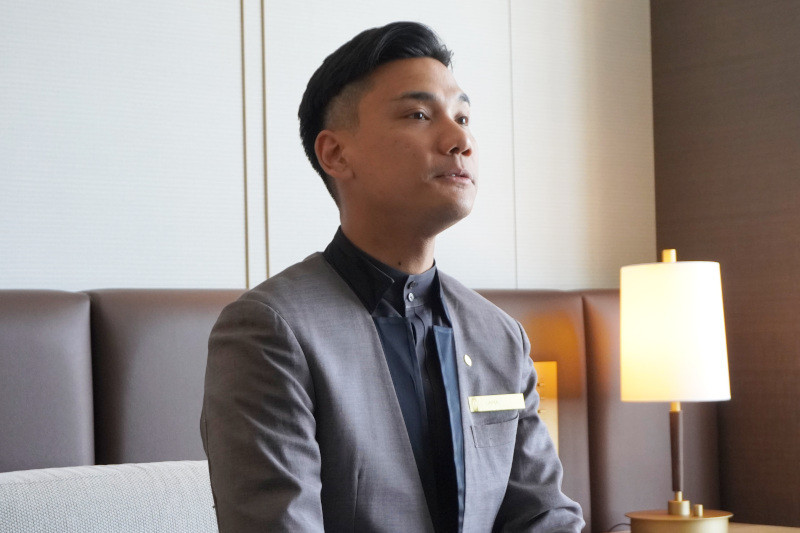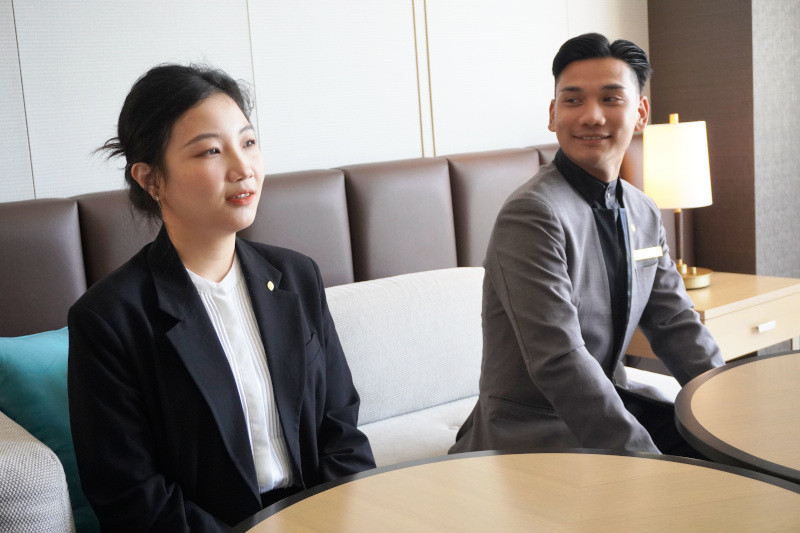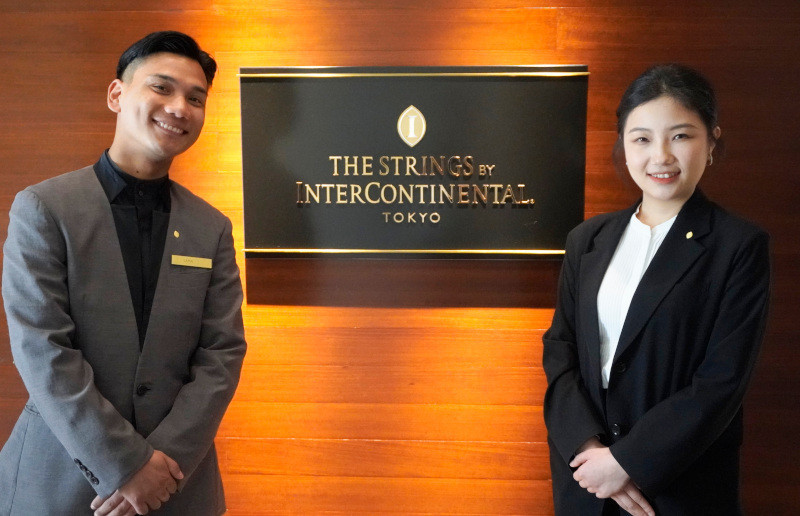Shinagawa Station in Tokyo is home to many famous companies, and has even become a strange inbound tourist destination for observing the rush hour. Located in one of Japan’s leading business districts, The Strings by InterContinental Tokyo (henceforth referred to as "The Strings Hotel Tokyo") is a luxury hotel offering such elegant service that you can forget about your busy everyday life.
“InterContinental” is the world’s first and largest luxury hotel brand. In order to provide the best service to each and every guest from diverse cultural backgrounds, it is essential that they have overseas staff that also come from diverse backgrounds.
How does this world famous hotel brand balance a comfortable working environment for foreign personnel and top-class level “omotenashi” in Japan? We interviewed two staff members who joined The Strings by InterContinental Tokyo through WeXpats Agent.
Left: Ren (From China / Joined 2023 / Marketing Communications Department)
Right: Suman (From Nepal / Joined 2023 / Guest Experience Department)
 Are you having any issues with job-hunting in Japan?
Are you having any issues with job-hunting in Japan?
“Tokyo-ness is Diversity” A Hotel That Respects Each and Every Staff Members’ Background
―― InterContinental is a luxury hotel brand with many fans around the world. Each of its hotels has its own concept, so what concept does The Strings by InterContinental Tokyo have?
Ren
The concept is “Tokyo, personally orchestrated". The sound of Tokyo played for each guest with each staff member as a string player, and the team working together to provide a service that is as beautiful as the sound of an orchestra.
―― Looking closely, I can see that the hotel has incorporated music motifs into various parts of its design.

We also value “diversity” so that guests that come from far away can feel the “Tokyo-ness”.
―― “Tokyo-ness” and “Diversity”, you say?
Suman
That’s right. Tokyo is one of the world’s leading globalised cities. People from various countries gather here, harmonising with Japan’s refined culture, and creating a unique scene that can only be seen in Tokyo.
The Strings Hotel Tokyo’s idea of “Tokyo-ness” is the same. Our employees that come from various backgrounds create a sense of internationalism while providing “omotenashi” that incorporates Japanese culture. We want guests to experience the “Tokyo-ness” that is only available at The Strings Hotel Tokyo.
―― In other words, an environment where Suman and Ren that come from overseas can thrive and be true to themselves is what makes up The Strings Hotel Tokyo’s “Tokyo-ness”!
―― I think it is a wonderful philosophy. What kind of work do the both of you do?
Ren
I am in charge of marketing. I’m involved in a wide range of PR tasks including dealing with the media and influencers, creating flyers, designing promotional materials for events, operating social media, and planning collaborations with other brands.
Suman
I am part of the accommodation department, and am involved in all aspects of improving the quality of our guests’ experience. I have to understand the requests and characteristics of each guest, and provide them with the most appropriate service. It is a job that directly connects to our guests’ smiles!
―― What makes you feel this is a good place to work?
Suman
Above anything else, the ease of communicating between colleagues. At our workplace, both Japanese and English are widely used amongst the staff, so if there is something I don't understand then it is explained to me in English. Internal emails are also written in both Japanese and English, which surely makes it a comfortable working environment for English-speakers.
Ren
I agree. In order to achieve the concept of “Tokyo, personally orchestrated. The sound of Tokyo played for each guest”, we need teamwork and bonds between employees that overcome the boundaries of departments, which is why communication between employees is so important. There are a wide range of measures to achieve that.
A typical example of this is language training conducted by external instructors. Around once a week, Japanese and English training is held. The training is designed to help employees use proper honorific language when speaking to customers, but it also aims to encourage conversations between employees.
―― This interview is being conducted in Japanese, but I notice that the both of you are good at using honorific language (Keigo).
Suman
Thank you! I owe it all to the language training. The Strings Hotel Tokyo requires the highest level of honorific language, so there is a limit to self-studying. But now communicating with the Japanese staff has become even more enjoyable, and I am truly grateful.
Ren
I am happy with the English language training. I was able to learn practical business English, which will be useful for my work and for my future.
―― Are there any other initiatives?
Ren
There are opportunities for communication through in-house events that all staff can participate in, such as sports events and New Year's parties. We also have a committee for corporate volunteer activities, and I am one of the managing members (laughs)
Suman
In the first place, everyone loves to talk, so we often end up becoming friends while working together (laughs)
For example when employees are in the elevator together, nobody touches their phone, but starts chatting harmoniously! People from different departments who don’t know each other’s names start talking about the weather, and everyone has a sense of working together making it a comfortable place.
Ren
I experienced many culture shocks when living in Japan, but I don't remember having any unpleasant experiences with the staff at The Strings Hotel Tokyo. The people there are all considerate of each other, so I really want to talk to them more and become closer to them.
―― It’s because you all respect each other’s backgrounds and cultures isn’t it.
Ren
Yes! I feel that too. For example, in China we celebrate the Lunar New Year instead of January 1st, so it’s common to take holidays to coincide with it. I think that it is because it is The Strings Hotel Tokyo that they can respect the cultural difference and say, “Sure, go ahead and take your holiday for the Lunar New Year”.
Suman
Of course this is limited to the extent that it does not affect work, but I think it is one of the easiest workplaces to take time off within the accommodation industry. I also took a month off to go back to Nepal. When you go back to your home country, you want to take as much time off as you can, it is certainly possible to take a long break if you adjust your shift and responsibilities. Thanks to this, I was able to fulfil my first trip back in 5 years!
―― I see. So behind the top-notch hospitality is a comfortable working environment and fulfilling private life for the employees.
Writer's Pick
Flexible Career Support and “Hiring by Personality”
―― Now let’s talk about careers, including human resources. How does The Strings Hotel Tokyo support its employees’ career?
HR Department Recruiter
We have nationally qualified career consultants on staff who hold regular 1-on-1 sessions with employees to ensure they always have a grasp on their desired career paths. We also have internal recruitment across industries, so for example you can change careers from front desk reception to secretary, or to sales.
―― What kind of career do the both of you have in mind?
Ren
My short-term goal is to be able to utilise my language skills and marketing to influence people of various nationalities. To that end, I am making full use of the language training we previously talked about in order to raise my English level. In the near future, I also plan to take the TOEIC examination.
In 5 to 10 years, I want to become a manager or director in the marketing department. Right now, I am only partly in-charge of planning. I want to eventually be able to write, plan and oversee proposals like my seniors do.
―― What about Suman?
Suman
My goal since Nepal has been to work at a hotel in Tokyo, so being able to work in The Springs Hotel Tokyo is like a dream come true (laughs)
However, I am still not satisfied, and will continue to aim to provide even greater service. There is nothing more rewarding than seeing the smiles of our guests, so I would like to continue building my career in a direction where I can continue to directly interact with guests.
HR Department Recruiter
Suman just got promoted a month before this interview.
―― Oh, congratulations!
Suman
Thank you. I will study Japanese harder, and put all my heart into my work!
Ren
There was an incident where I was really touched by Suman’s work. I was helped by Suman when recording a video for advertising. He was particular about the shape of the swans that were laid out on the bed, carefully setting them up with his feelings put into his work, and I thought he must be someone who works hard for his guests and friends.
―― That’s a wonderful story. I’m sure people will be interested in job openings at The Strings Hotel Tokyo after reading this interview. What do you focus on when hiring?
HR Department Recruiter
As you can see from Suman and Ren, the most important thing is character. In addition to your attitude towards work, we also place importance on the value of teamwork, and respect towards internationalism and diversity. And, because of that, this is a comfortable place to work for overseas people.
Suman
Ren and I were both inexperienced in hotel work when we joined The Strings Hotel Tokyo. This is a workplace that gives you opportunities to challenge yourself, so those who are interested, please apply.
Used by Suman and Ren! What is WeXpats Agent?
Suman and Ren who we interviewed in this article found work at The Strings by InterContinental Tokyo through WeXpats Agent, a career support service that specialises in employment for foreign nationals.
Recruitment agencies in Japan are a service where dedicated career advisors will assist you with your job hunt for free. In addition to introducing open positions, we also provide support to help you create your Japanese resume and practise for interviews. Worried about job hunting in Japanese? We are here for you.
Features of WeXpats Agent
-
We have many job openings that are a good fit for foreign nationals to work in, such as translation, interpretation, inbound, etc. jobs that make use of your language skills, as well as engineering etc. jobs that do not require Japanese skills.
-
Our career advisors support and help you prepare your resume and practice job interviews with you. Clearly communicate your strengths to the hiring company.
-
We will handle communication with companies on your behalf, such as arranging interview dates and negotiating conditions. And thereby reducing your stress and time spent.


